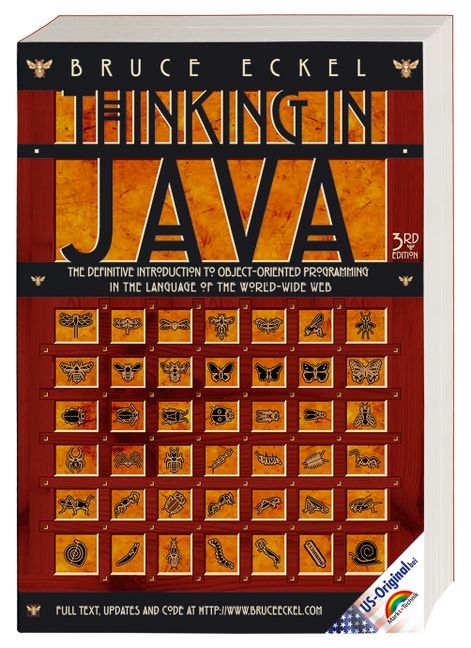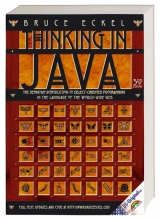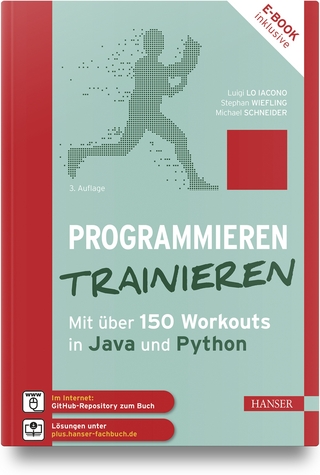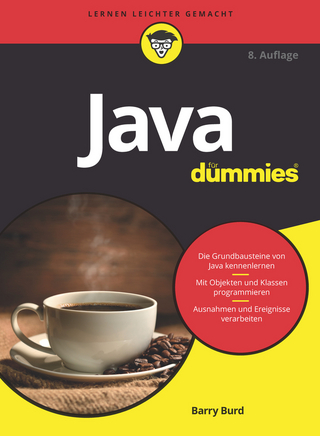Thinking in Java
Markt & Technik Imprint in der Pearson Education Deutschland (Verlag)
978-3-8272-6896-9 (ISBN)
- Titel ist leider vergriffen;
keine Neuauflage - Artikel merken
About the Author:
Bruce Eckel is the author of “Thinking in C++” , which won the Software Development Jolt Award for best book of 1995. He's been professionally programming for 20 years and has been teaching people throughout the world how to program with objects since 1986, first as a renowned speaker and consultant on C++ and now in Java. He was a voting member of the C++ Standards Committee. He has written five other books on object-oriented programming, published over 150 articles, and has been a columnist for various computer magazines, including the Java columnist for Web Techniques. He chairs the C++ and Java tracks for the Software Development Conference and holds a BS in Applied Physics and an MS in Computer Engineering.
Table of Contents
Preface.
Preface to the 3rd edition. Java 2, JDK 1.4.
Introduction.
Prerequisites. Learning Java. Goals. JDK HTML documentation. Chapters. Exercises. The CD ROM. Source code. Java versions. Errors. Note on the cover design. Acknowledgements.
1. Introduction to Objects.
The progress of abstraction. An object has an interface. An object provides services. The hidden implementation. Reusing the implementation. Inheritance: reusing the interface. Interchangeable objects with polymorphism. Object creation, use & lifetimes. Exception handling: dealing with errors. Concurrency. Persistence. Java and the Internet. Why Java succeeds. Java vs. C++? Summary.
2. Everything is an Object.
You manipulate objects with references. You must create all the objects. You never need to destroy an object. Creating new data types: class. Methods, arguments, and return values. Building a Java program. Your first Java program. Comments and embedded documentation. Coding style. Summary. Exercises.
3. Controlling Program Flow.
Using Java operators. Execution control. Summary. Exercises.
4. Initialization & Cleanup.
Guaranteed initialization with the constructor. Method overloading. Cleanup: finalization and garbage collection. Member initialization. Array initialization. Summary. Exercises.
5. Hiding the Implementation.
Package: the library unit. Java access specifiers. Interface and implementation. Class access. Summary. Exercises.
6. Reusing Classes.
Composition syntax. Inheritance syntax. Combining composition and inheritance. Choosing composition vs. inheritance. protected. Incremental development. Upcasting. The final keyword. Initialization and class loading. Summary. Exercises.
7. Polymorphism.
Upcasting revisited. The twist. Abstract classes and methods. Constructors and polymorphism. Designing with inheritance. Summary. Exercises.
8. Interfaces & Inner Classes.
Interfaces. Inner classes. Why inner classes? Summary. Exercises.
9. Error Handling with Exceptions.
Basic exceptions. Catching an exception. Creating your own exceptions. The exception specification. Catching any exception. Standard Java exceptions. Performing cleanup with finally. Exception restrictions. Constructors. Exception matching. Alternative approaches. Exception guidelines. Summary. Exercises.
10. Detecting Types.
The need for RTTI. RTTI syntax. Reflection: run time class information. Summary. Exercises.
11. Collections of Objects.
Arrays. Introduction to containers. Container disadvantage: unknown type. Iterators. Container taxonomy. Collection functionality. List functionality. Set functionality. Map functionality. Holding references. Iterators revisited. Choosing an implementation. Sorting and searching Lists. Utilities. Unsupported operations. Java 1.0/1.1 containers. Summary. Exercises.
12. The Java I/O System.
The File class. Input and output. Adding attributes and useful interfaces. Readers & Writers. Off by itself: RandomAccessFile. Typical uses of I/O streams. File reading & writing utilities. Standard I/O. New I/O. Compression. Object serialization. Preferences. Regular expressions. Summary. Exercises.
13. Concurrency.
Motivation. Basic threads. Sharing limited resources. Improperly Thread states. Cooperation between threads. Deadlock. The proper way to stop. Interrupting a blocked thread. Thread groups. Summary. Exercises.
14. Creating Windows & Applets.
The basic applet. Running applets from the command line. Making a button. Capturing an event. Text areas. Controlling layout. The Swing event model. A catalog of Swing components. Packaging an applet into a JAR file. Signing applets. JNLP and Java Web Start. Programming techniques. Concurrency & Swing. Visual programming and JavaBeans. Summary. Exercises.
15. Discovering Problems.
Unit Testing. Improving reliability with assertions. Building with Ant. Logging. Debugging. Profiling and optimizing. Doclets. Summary. Exercises.
16. Analysis and Design.
Methodology. Phase 0: Make a plan. Phase 1: What are we making? Phase 2: How will we build it? Phase 3: Build the core. Phase 4: Iterate the use cases. Phase 5: Evolution. Plans pay off. Extreme Programming. Strategies for transition. Summary.
A. Passing & Returning Objects.
Passing references around. Making local copies. Controlling cloneability. Read-only classes Summary. Exercises.
B. Java Programming Guidelines.
Design. Implementation.
C. Supplements.
Foundations for Java seminar-on-CD. Thinking in Java seminar. Hands-On Java seminar- on-CD 3rd edition. Designing Objects & Systems seminar. Thinking in Enterprise Java. The J2EE seminar. Thinking in Patterns (with Java). Thinking in Patterns seminar. Design consulting and reviews.
D. Resources.
Software. Books.
Index.
| Zusatzinfo | 1 CD |
|---|---|
| Sprache | englisch |
| Maße | 170 x 240 mm |
| Gewicht | 1900 g |
| Einbandart | Paperback |
| Themenwelt | Informatik ► Programmiersprachen / -werkzeuge ► Java |
| Schlagworte | HC/Informatik, EDV/Programmiersprachen • Java 2 (Programmiersprache); Einführung • Objektorientierte Programmierung |
| ISBN-10 | 3-8272-6896-6 / 3827268966 |
| ISBN-13 | 978-3-8272-6896-9 / 9783827268969 |
| Zustand | Neuware |
| Haben Sie eine Frage zum Produkt? |
aus dem Bereich




